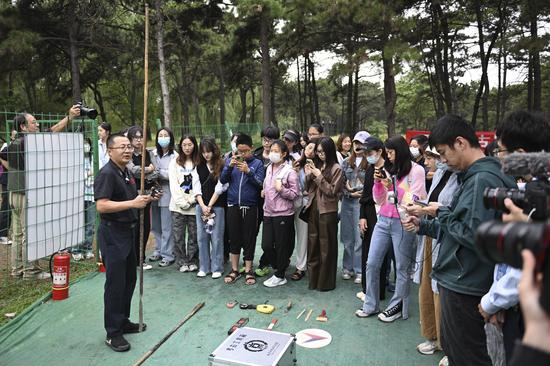Guideline urges criminal punishment for severe acts of insult, defamation
Chinese police, prosecutors and judges have been required to strictly fight cyberbullying-related crimes, especially those harming juveniles, so as to strongly protect the legitimate rights of internet users and further purify the online environment, according to a legal guideline on the handling of cyberbullying-related cases that was released on Monday.
Individuals or departments that bully the disabled in cyberspace, fabricate sex-related topics to infringe upon others' dignity, or use generative artificial intelligence technologies to post illegal information, will also be harshly punished, said the guideline, which was jointly issued by the Supreme People's Court, the Supreme People's Procuratorate and the Ministry of Public Security.
The 20-article guideline orders police, prosecutors and judges to accurately apply the crimes of insult and defamation in line with the Criminal Law, with intensified efforts to combat cyberbullying on internet platforms.
"Insult and defamation are two major crimes related to cyberbullying, but charges have seldom been laid in recent years," said Zhou Jiahai, deputy head of the SPC's Research Office.
Last year, Chinese courts dealt with 618 criminal cases of defamation, about four times more than in 2013, but just 43 defendants received punishments last year, Zhou said.
"The contrast in the numbers, on one hand, stems from the fact that many lawsuits were initiated by individuals who had more difficulties collecting evidence, compared with prosecutors," he explained. "On the other hand, when prosecutors should intervene in the investigation of such cases is not clear in current laws."
To solve the problem and give stronger protection to victims of cyberbullying, authorities released the guideline with specifics on when prosecutors can take action, he added.
Under the guideline, people will be charged with the crime of insult or defamation if the misconduct causes others or their family members mental disorders or even suicide.
Those who insult or slander several others, or spread defamation multiple times, bringing seriously negative effects to society, will also be prosecuted, the guideline said.
It also allows prosecutors to initiate public-interest lawsuits if they find internet service providers do not take measures or perform their duties when cyberbullying happens on their platforms, causing improper or even illegal content to be spread online.
Highlighting the significance of the fight against cyberbullying, Sun Ping, an official from the public security ministry, said police officers nationwide will begin investigations and file cases in a timely manner after receiving relevant evidence.
"We'll also work with cyberspace departments to increase security supervision on internet platforms to ensure cyberbullying-related content can be discovered as quickly as possible," she added.
As a global issue, cyberbullying has frequently made the headlines over the past few years.
Tragedies caused by online misconduct have also received massive public attention and prompted cyberspace agencies, judicial authorities and internet platforms, to take action.
Late last year, the Cyberspace Administration of China, the country's top internet regulator, issued a regulation urging online platforms and websites to set up express channels for netizens to report cyberbullying and help them block unfriendly comments from strangers via technical means.


















































 京公网安备 11010202009201号
京公网安备 11010202009201号